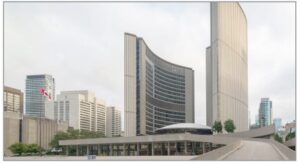The great rush: 102 candidates to become Toronto’s next mayor
TORONTO – There is no doubt: Toronto voters will be spoiled for choice on June 26 when they’ll go to the polls to choose their city’s next mayor. The nominations for the extraordinary by-election to choose a new mayor, following the resignation of John Tory, officially closed at 2pm on Friday and according to the City’s website there are 102 registered candidates: current and former city councilors, former parliamentarians and deputies, civic activists, school administrators but also many ordinary people who probably just want to “see the effect” having their name on the ballot paper. A card that promises to be mileage, given the number of names it will contain.
But, as we said, almost half of the aspiring mayors don’t actually seem really interested in participating in the electoral campaign, as can be understood from the list of candidates published on the Municipality’s website: 46 of them have in fact not provided any type of contact (e- email or telephone number), nor they activated profiles on social networks or websites to make themselves known to voters and share ideas and programmes. And only about thirty of the more than one hundred candidates have a complete profile, with all the contacts and web and “social” pages necessary to reach citizens.
Meanwhile, the latest polls still see former MP Olivia Chow in the lead, including last Friday by Mainstreet Research which interviewed 1,205 Toronto voters between May 10 and 11: 31% of voters decided intend to vote for the Chow; followed by 15% for Ana Bailão, 12% for Mark Saunders, 10% for Josh Matlow, 9% for Mitzie Hunter, 7% for Anthony Furey, 6% for Brad Bradford and 5% for Chloe Brown. “It looks like it’s becoming a two-three race” Mainstreet Research president Quito Maggi told CP24 on Friday morning, adding that with just a few weeks left before the election, it could be difficult for those lagging behind to catch up. But it is also true that so far there has been little debate and some political observers say seeing candidates pitted against each other could be an opportunity for some to gain some momentum. And there are also those who suggest that some candidates probably prefer to keep “aces up their sleeve” for the last few days of the electoral campaign.
Among the candidates, who could score valuable points in the next few days is Mark Saunders, former chief of the Toronto Police, after the endorsement of the premier of Ontario, Doug Ford. While not naming him, Ford said on Friday that “we need someone who has experience dealing with crime. Someone who has actually managed a number of employees”. And then, throwing a “shot” at some of Saunders’ main rivals, in particular those who have held or hold the role of city councilor – Ana Bailão, Olivia Chow, Brad Bradford and Josh Matlow – he added: “We need someone that he knows all of Toronto, not a little ward that they’ve represented, but all of Toronto”.
Obviously, the reaction of the other candidates was annoyed: they defined it as “inappropriate” for the premier to take a position in a mayoral election. Ford spokeswoman Caitlin Clark replied: “The premier said he will work with anyone and that’s what he intends to do”. But it is clear that, having recently given the mayor of Toronto the “superpowers” that allow the mayor himself to govern with the support of a small number (eight) of advisers, Ford would prefer someone he can trust. Because the risk is that those “superpowers” will turn against him.




